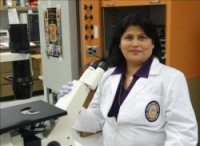Linking Neurodegeneration to Protein Turnover in Ataxia Telangiectasia
Research Project Information
Principal researchers: Professor Shyamal Desai
Institute: Louisiana State University Health Sciences Centre, United States of America
Grant awarded: Funded in partnership with the A-T Children’s Project
Project completion date: July 2013
Project Overview
Nerve cells (neurons) within the brain of Ataxia Telangiectasia (A-T) patients are defective in repairing damaged DNA. Consequently, A-T neurons can die when exposed to even mild genotoxic or DNA damaging agents. Professor Desai and her research team’s past work has shown that calls obtained from A-T patients are also defective in degrading proteins damaged by genotoxic agents. Moreover, they demonstrated that elevated levels of the ISG15 (Interferon-Stimulated Gene 15) protein was responsible for this defect in A-T cells.
Defective protein degradation has been cited as a cause of neurodegeneration in other neurological disorders such as Alzheimers, Parkinsons, and Huntingtons disease. The goal of this grant was to investigate whether ISG15-mediated defective protein degradation contributes to neurodegeneration in an A-T mouse model.
Project Outcome
Professor Desai’s research group demonstrated that the concentration of ISG15 is exclusively elevated in neurons within the cerebellum region of A-T mice’s brains compared to normal size. In addition, they observed abnormal degradation of proteins after “protein damage” was induced by a genotoxic agent compared to normal mouse cerebellar cells grown in a petri-dish. They propose that the elevated concentration of ISG15 may be responsible for abnormal protein degradation in cerebellar cells, which may induce their death.
Publications
- Desai, S.D.; Reed, R.E.; Babu, S.; Lorio, E.A.; ISG15 Deregulates Autophagy in Genotoxin-treated Ataxia Telangiectasia Cells. The Journal of Biological Chemistry 2013, 288, 2388-2402
- Kim, C.D.; Reed, R.E.; Desai, S.D.; Organotypic Mouse Cerebellar culture Model of Ataxia Telangiectasia.Manuscript in preparation.
- Reed, R.E.; Kim, C.D.; Ochoa, A.; Hernandez, C.; Desai, S.D.; ISG15 Inhibits Mitophagy in Ataxia Telangiectasia Cells. Manuscript in preparation.
What Next?
Identifying the causes of neurodegeneration in A-T patients is crucial for developing new drugs to treat A-T. Experimental results from Professor Desai’s research group suggest that the disruption of protein degradation by ISG15 may be a cause of cerebellar neurodegeneration (neuronal cell death) in A-T. This exciting discovery indicates ISG15 as a potential target for future drugs and may therefore provide a new opportunity for treating A-T.





